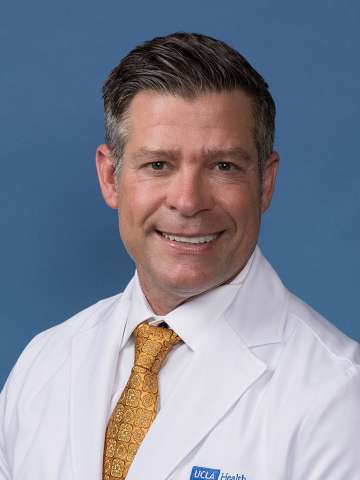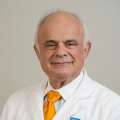The Men's Clinic at UCLA
At The Men’s Clinic, our urologists are improving the way men access health care services.

Why choose UCLA Health for men’s health care?
Through The Men’s Clinic at UCLA Health, we treat all types of conditions that affect men’s urologic, sexual, and reproductive health. We aim to be an active part of changing how men interact with health care services.
Many men don’t seek regular medical care until they turn 50 and start prostate cancer screenings. But there are many health issues that can occur before age 50. When you choose UCLA Health for urology services, you are choosing:
Established experience: Our specialists have years of experience in urology and men’s sexual and reproductive health care. We provide the highest-quality care and have performed thousands of surgeries with excellent success rates.
Comprehensive treatment: We partner with multiple specialists, such as cardiologists, endocrinologists and dietitians to provide all the specialty care you may need.
Increased access to care: To increase access for all patients, we offer clinic visits through a secure video connection. Telehealth provides patients with more options for accessing their care, including completing a visit from the comfort of their own homes.
Our services
We provide a comprehensive range of services designed to optimize men’s health care. Our services include:
Hormone management
In the United States, experts estimate that around 15 million men have low testosterone (hypogonadism). Low testosterone can affect multiple aspects of your life, from a decrease in fertility to loss of libido to lack of concentration.
Our specialists offer individualized treatment plans for low testosterone. We offer every type of testosterone therapy, including oral medications, gels, injections and implanted long-acting pellets.
Fertility
We have multiple areas of focus for improving fertility for men and individuals with external reproductive organs. These services include:
Cancer fertility management: We partner with oncologists and reproductive endocrinologists to ensure that men with cancer diagnoses learn about fertility risks and treatment options. We offer several fertility preservation and treatment options, including sperm banking and assisted reproductive technology.
Cystic fibrosis fertility treatment: Cystic fibrosis is a genetic condition that can cause the vas deferens (tube that transfers sperm) to deteriorate, even before birth. Through The Men’s Clinic, we offer fertility treatment for men with cystic fibrosis. Often, we can use a technique called microsurgical epididymal sperm aspiration to extract sperm directly from the testicles.
Male fertility evaluations: Experts estimate that up to one-third of couples have trouble getting pregnant due to male infertility. At The Men’s Clinic, we perform comprehensive fertility assessments to find the root cause of fertility problems. Your fertility evaluation may include blood work, semen analysis or an ultrasound examination.
Semen analysis: We provide discrete in-house, cost-effective semen analysis with same-day results. We give results immediately so we can talk through appropriate treatment plans before you even leave our clinic. We sometimes use a test called a DNA fragmentation index to determine if sperm is the cause of recurrent miscarriages.
Spinal cord injury fertility: Spinal cord injuries often interfere with ejaculation; but in many cases, a man’s sperm production is still typical. We use a variety of strategies to retrieve sperm for fertility treatments. If you have a spinal cord injury, you may be a candidate for intrauterine insemination (IUI) or in vitro fertilization (IVF).
Trans-female fertility evaluation: Prior to bottom gender affirmation surgery and hormone affirmation therapy, trans-women can provide sperm samples to freeze for later use if they decide they want to become a biological parent.
Penile rehabilitation
Erectile dysfunction is extremely common after a prostatectomy (prostate removal). Without assistance, full recovery can take one to two years. Through our clinic, we offer treatments to facilitate quicker recoveries.
You may be a candidate for oral medications, injection therapy or vacuum erection pumps. These pumps help improve blood flow and enable men to achieve sexual function after prostate cancer.
Sexual health
Sexual health is commonly difficult to discuss. But men who remain sexually active later in life tend to live longer and feel more fulfilled.
We encourage men to discuss medical issues such as erectile dysfunction, diminished libido (sex drive) and other challenges. Our specialists are experts in treating sexual and reproductive health concerns. In fact, we have achieved national recognition for our clinical and surgical management of men’s reproductive, sexual, and hormonal conditions.
Men’s health conditions we treat
The specialists in The Men’s Clinic treat a variety of conditions, including:
Benign prostatic hyperplasia: As men age, their prostates can enlarge and cause urinary symptoms including slowed urinary stream, increased frequency and getting up frequently at night to urinate.
Ejaculatory dysfunction: Orgasm and ejaculation are complex hormonal, psychological and neurological processes and men can suffer from either too rapid ejaculation or delayed ejaculation and absence of orgasm. Many times, there is a medical solution for ejaculatory disorders.
Erectile dysfunction: Inability to get or maintain an erection long enough for sexual intercourse.
Hydrocele: A type of swelling in the scrotum that occurs when fluid collects in the thin sheath surrounding a testicle.
Hypogonadism (low testosterone): When your body doesn’t produce enough testosterone (male sex hormone).
Peyronie’s disease: When scar tissue inside the penis leads to a painful, curved erection. As of 2013, there are FDA approved medical therapies to treat this debilitating condition. Some men may also benefit from advanced surgical techniques to improve their quality of life.
Prostatitis: Inflammation and swelling in the prostate (small gland that produces semen and sperm).
Spermatocele: A common growth that develops right above or behind the testicle.
Varicocele: One of the most common causes of testicular discomfort and male fertility issues is a varicocele. Varicoceles are abnormal swollen veins that surround the testicle and can be treated with a minimally invasive microsurgical procedure.
Treatments urologists offer
All our treatments aim to improve quality of life, and sexual and reproductive health. Some of the primary treatments we offer include:
Testosterone replacement therapy: Taking androgens (male hormones) to treat conditions such as hypogonadism.
Sperm extraction: Procedures to take sperm directly from the testicles for fertility treatment.
Vasectomy: Cutting or sealing the vas deferens (tubes that carry sperm) to prevent pregnancy.
Vasectomy reversal: Reconnecting the vas deferens to enable pregnancy.
Microsurgical varicocelectomy: Removing swollen or enlarged veins in the scrotum (varicocele).
Penile implant surgery: A procedure to implant a device designed to help a man achieve erection.
Testicular implant surgery: A prosthetic testicle made of saline and designed to look and feel realistic.
Xiaflex: A medication that is used to treat Peyronie’s Disease. It is an enzyme (collagenase clostridium histolyticum) that breaks down certain types of collagen found in scar tissue. The purpose of Xiaflex treatment is to soften or dissolve your penile plaque, resulting in an improvement in the shape deformity.
Director
Male Reproductive Medicine and Surgery Clinical Team
Contact us
Call 310-794-7700 to request an appointment with a urologist at UCLA Health.
Find your care
We provide men’s health care in one convenient clinic. To learn more about our services, call 310-794-7700.







